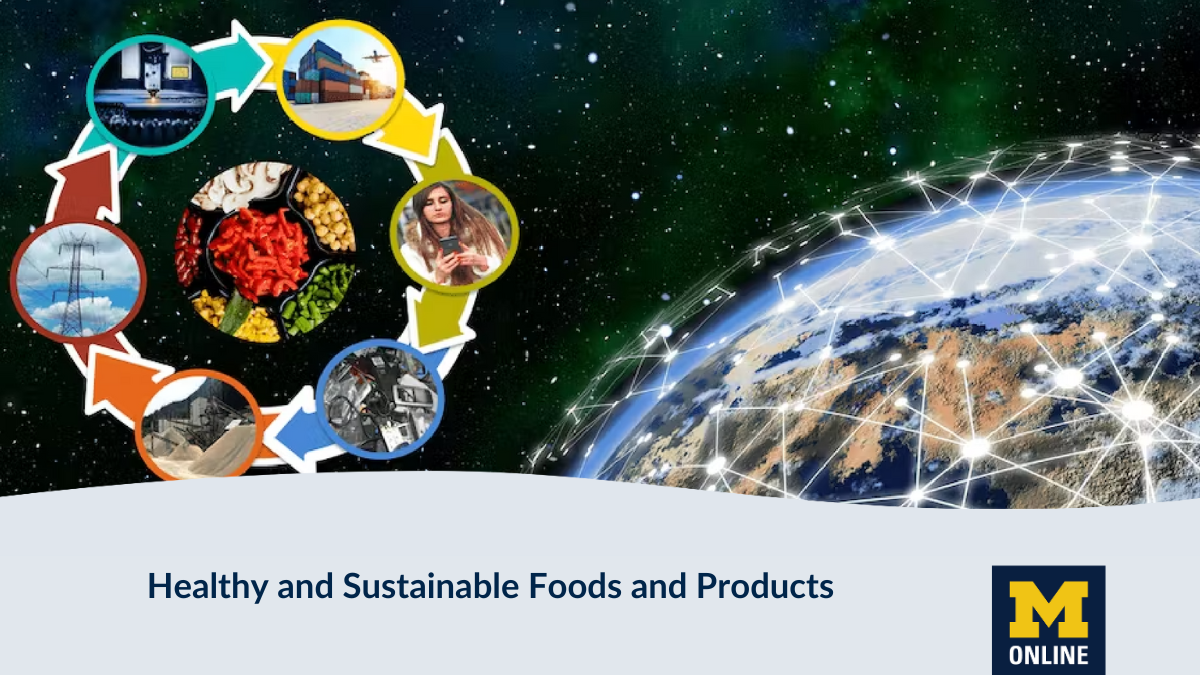
Learn the Health and Environmental Impacts of the Foods We Eat and Products We Buy
‘Healthy and Sustainable Foods and Products’ explores dietary risk factors, product life cycles, and provides tools to understand the impacts of the foods we consume
Sean Corp, Content Strategist
Interest in sustainable living has never been higher. A recent study by NielsenIQ found that 78% of US consumers said a sustainable lifestyle was important to them. Part of the reason for increased interest in human and environmental health is greater access to information on the items people consume – from nutrition information, ingredient lists, and product labels.
However, making sustainable decisions is not as easy as reading how many calories are in the foods we eat or the list of ingredients in our beauty products. A new open online course series on Michigan Online gives people a better understanding of sustainability. It gives them tools to understand how choices will impact their personal health and the environment.
The four-course series "Healthy and Sustainable Foods and Products" offers a roadmap to a sustainable lifestyle by identifying the health and environmental risk factors associated with thousands of foods and products and provides quantitative metrics, data, and tools to drive decision-making.
Olivier Jolliet, emeritus faculty of environmental health sciences at the U-M School of Public Health, and his co-instructors walk learners through concepts like sustainable development, the global burden of disease, and life cycle assessment methodology.
Jolliet, who now works at the DTU-Sustain Department of the Technical University of Denmark, co-initiated the Life Cycle Initiative at the United Nations Environmental Program, which is coordinating the efforts of more than 150 scientists worldwide. In 2022, the Society of Environmental Toxicology and Chemistry awarded him the Lifetime Achievement Award.
Chicken Wings = 3.6 Minutes Lost of a “Healthy” Life
In the series, Jolliet introduces learners to the Health Nutritional Index (HENI) and allows learners to calculate the health impacts of foods in minutes of life lost or gained.
For example, Jolliet breaks down the impact of sodium from one serving of chicken wings. First, Jolliet says, you break down the nutritional components of the chicken wings, including calcium, polyunsaturated fat, sodium, trans fat, and saturated fat. You then weigh that against known dietary risk factors such as cancer, heart disease, and cardiovascular disease. From there, you get a metric in disability-adjusted life years (called DALYs), and you rescale your result to get to minutes of healthy life lost or gained.
Using that methodology, the sodium in a serving of chicken wings has a HENI score of 3.6 minutes of healthy life lost. The course not only walks learners through the process, it provides access to information on thousands of common foods. Through this information, Jolliet says, people can make more informed decisions about the foods they eat and find the balance and diet that works best for them.
Life Cycle Assessment – ‘From the Cradle to the Grave’
The course series does not only examine foods. Jolliet also uses the Life Cycle Assessment methodology to explore the environmental impact of products and systems over the entire product life cycle. Learners engage in case studies in several industrial sectors, including agriculture, automotive, personal care products, and energy. The course series also explores the health impacts of chemicals in products.
“It’s crucial that we understand how products are impacting the world,” Jolliet says. “Everything has emissions associated with it from the ‘cradle to the grave.’ There are emissions during its production, throughout the supply chain, and even the ‘end of its life’ when it is disposed of or recycled.”
Understanding the entire life cycle is key to sustainability efforts because while 80% of environmental efforts focus on the production stage, that can represent only 20% of a product’s environmental impact, Jolliet says.
Jolliet designed every component of the series to give people the information to understand sustainability and the tools needed to make more informed decisions.
"We partner with you in this course so that you can learn and master several science-based tools to support your decision-making towards a more healthy and sustainable lifestyle,” Jolliet says.